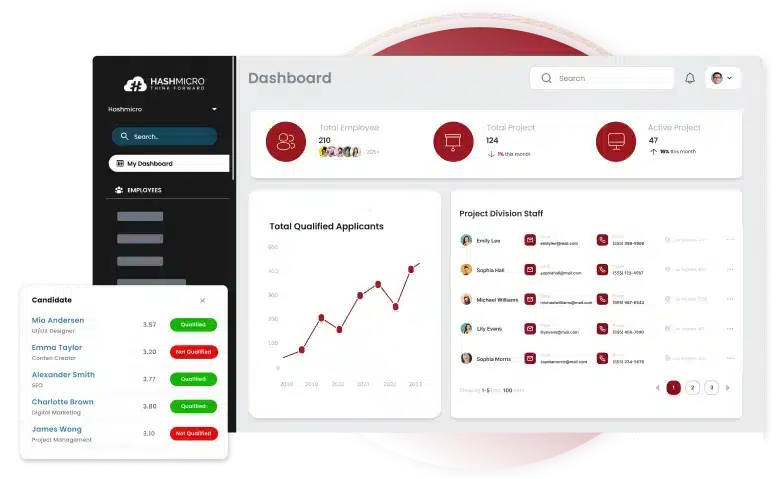An Employee Value Proposition (EVP) is a strategic asset that attracts, engages, and retains top talent. While many think salary is key, today’s workforce seeks culture, values, and growth opportunities that align with their goals.
Without a compelling EVP, companies risk losing potential talent to competitors who better communicate their offerings. This highlights the need for a well-crafted EVP that resonates with the right candidates.
HashMicro HR management system Malaysia can help streamline developing and communicating a strong EVP. Its tools ensure your company’s values and opportunities are effectively highlighted to attract top talent.
This article will explore how to craft an EVP that aligns with your company’s values and appeals to potential employees.
Key Takeaways
|
Table of Content
Content Lists

What is an Employee Value Proposition (EVP)?
An Employee Value Proposition (EVP) represents the unique value your company offers to employees in return for their skills, experience, and dedication. It encompasses tangible benefits like salary, incentives, and work-life balance, while also reflecting your company’s values, mission, and culture. Essentially, the EVP communicates to both potential and current employees what they can expect from working at your organization.
The employee value proposition meaning can vary between current employees and potential candidates. What you emphasize to attract new talent might differ from what you focus on for those already within the organization. For instance, while potential hires might be drawn to growth opportunities and workplace value offering, current employees might value stability and respect. Recruitment software can aid in tailoring these messages to different audiences effectively.
Understanding what is employee value proposition is crucial for aligning your company’s goals with the aspirations of your workforce. By clearly defining your EVP, you can ensure that it resonates with individuals who share your company’s vision and values.
Difference between Employee Value Proposition and Employer Brand
An employee value proposition (EVP) specifies what employees receive in return for their loyalty and commitment. It’s the promise made to your team, detailing workplace benefits, such as those found in employee value proposition examples like competitive salaries and career development.
The employer brand, on the other hand, is how potential employees perceive your company. It showcases your company’s mission, values, and culture externally. Key performance indicators can help measure its effectiveness in attracting talent.
Although distinct, the EVP and employer brand are interconnected. The employer brand publicly expresses the EVP, highlighting what makes your company unique. Aligning both ensures a cohesive message that attracts and retains top talent.
Why Does a Good Employee Value Proposition Matter?
A strong Employee Value Proposition (EVP) is crucial for attracting and retaining top talent, fostering a positive and productive workplace. By presenting a clear and authentic proposition to high-quality candidates and employees, businesses can differentiate themselves in a competitive market.
The benefits and return on investment (ROI) of a robust EVP include:
- Reduced Employee Turnover
A compelling EVP attracts employees who are passionate about their work and more likely to stay long-term. This reduces turnover rates and helps maintain a stable workforce, which is essential for effective succession planning. - Improved Employee Engagement
When employees understand the company’s mission and values, they become more invested in their work. Engaged employees are more productive and contribute to higher profitability and customer loyalty. - Boosted Performance and Growth
A well-defined EVP enhances employee satisfaction, leading to increased productivity and business growth. Happy employees are more likely to perform at their best, driving the company’s success. - Cost Savings
Attracting the right talent through a strong EVP lowers recruitment and training costs, as employees are more likely to remain with the company. This results in significant savings over time. - Greater Transparency
A clear EVP fosters trust and mutual respect between employer and employee by outlining expectations and rewards. This transparency builds a strong foundation for a positive workplace culture.
By investing in a strong EVP, companies can create an environment where employees feel valued and motivated, ultimately leading to sustained success and growth.
Key Components of an Effective Employee Value Proposition

Your Employee Value Proposition (EVP) is central to what makes your business appealing to both current and potential employees. It outlines the rewards, culture, and experiences employees can expect in return for their skills and commitment. While each company’s EVP is unique, several core elements should be included to create a compelling offer:
- Compensation
Beyond salary, compensation includes bonuses, benefits, and recognition that make employees feel valued. While financial rewards are important, many employees also seek a comfortable work-life balance. - Work-Life Balance
This goes beyond paid time off and flexible hours. It involves understanding what employees need to feel balanced in their personal and professional lives, such as remote work options or parental leave. - Affiliation and Reputation
Employees prefer to be associated with companies that have a strong reputation and align with their values. A positive company image can enhance employee pride and loyalty. - Personal Growth and Career Development
Employees seek opportunities to grow and advance their careers. Providing clear paths for development and skill-building is essential for retaining top talent. - Respect
A culture of respect ensures employees feel heard, valued, and supported. This foundation fosters loyalty and motivates employees to perform at their best.
By incorporating these elements, companies can craft an EVP that resonates with employees and supports a thriving workplace culture.
Steps to Crafting a Compelling Employee Value Proposition

Creating an effective Employee Value Proposition (EVP) involves showcasing your unique workplace benefits and culture. Here are the steps to develop an EVP that resonates with both current and future employees:
- Audit Your Current Offerings
Review the key elements of your EVP to identify what you already provide. Highlight strengths such as competitive salaries, health benefits, and well-being initiatives. This assessment helps you understand your existing workplace value offering. - Gather Employee Insights
Use surveys to collect feedback from employees at different stages of their journey. Onboarding surveys can gauge new hires’ perceptions, while engagement surveys reveal what motivates employees. Exit surveys provide insights into why employees leave. - Analyze Feedback
Evaluate survey results to identify strengths and areas for improvement in your EVP. Focus on key drivers of engagement and retention, considering generational preferences and priorities. - Draft Your EVP
Use the feedback to craft an authentic EVP that covers the essential elements and reflects your company’s uniqueness. Ensure it appeals to diverse candidates and aligns with your organizational goals. - Secure Internal Buy-In
Integrate your EVP into everyday business operations, including onboarding, career development, and leadership support. An embedded EVP turns employees into brand ambassadors. - Share Your EVP
Promote your EVP through marketing materials, job ads, and career websites. Make it a central part of your messaging to attract and retain top talent. - Monitor and Evolve
Regularly review and test your EVP’s effectiveness through surveys and feedback. Adjust as needed to stay relevant and impactful, ensuring it continues to resonate with employees.
By following these steps, companies can create an EVP that not only attracts talent but also fosters a positive and engaging workplace culture.
Enhancing Your EVP with HashMicro HR Software

Crafting a compelling Employee Value Proposition (EVP) is just the beginning. To truly bring your EVP to life, you need the right tools to ensure it resonates throughout the employee experience. HashMicro HR Software bridges the gap between strategy and execution, providing the systems needed to deliver on your EVP promises.
From simplifying onboarding to managing benefits and tracking development plans, HashMicro equips your team with the resources to create an enriching workplace. This comprehensive HR management system Malaysia supports your EVP by streamlining key processes and enhancing employee engagement.
Key features that help realize your EVP include:
- Face Recognition and GPS Attendance: Ensures fair attendance tracking, eliminating time fraud and making employees feel valued.
- Daily and Hourly Worker Payslip Management: Provides accurate, timely payments, reinforcing trust and satisfaction.
- Talent Management with KPI Tracking: Empowers employees by setting clear goals and offering measurable feedback for growth.
- Employee Development & Training Plans: Offers personalized training opportunities, helping employees advance their careers at their own pace.
- In-Depth Performance Analysis with Nine Box Matrix: Identifies high performers and potential, supporting transparent career progression.
- Automated Video Interview: Streamlines the hiring process, saving time for both recruiters and candidates.
By leveraging HashMicro HR Software, companies can effectively implement their EVP, ensuring it aligns with daily operations and enhances the overall employee experience.
Conclusion
An Employee Value Proposition (EVP) is your core promise to employees, offering a blend of tangible benefits like salary with your company’s values, culture, and growth opportunities. A well-crafted EVP not only attracts top talent but also fosters a thriving workplace where employees feel valued and motivated.
HashMicro HR software helps you bring your EVP to life by simplifying key HR processes. From efficient onboarding to transparent performance tracking, with features like automated interviews, talent management, and development plans, HashMicro empowers your team to grow, and retain the right talent. Additionally, integrating solutions like payroll software Malaysia can further streamline your HR operations, ensuring seamless payroll management.
Ready to make your EVP a reality? Experience the transformation with HashMicro’s free demo and see how it can elevate your HR management and support your talent attraction proposition.
FAQ on Employee Value Proposition
-
What is the employee value proposition?
The employee value proposition (EVP) is a unique set of benefits and values a company offers to its employees in exchange for their skills and commitment. It includes tangible rewards like salary and benefits, as well as intangible aspects like company culture and growth opportunities.
-
What are the 5 pillars of employee value proposition?
The five pillars of an employee value proposition typically include compensation, work-life balance, career development, company culture, and recognition. These elements collectively define what employees can expect from their workplace and help attract and retain talent.
-
What is the EVP strategy?
An EVP strategy involves crafting and communicating a compelling value proposition that aligns with company goals and resonates with employees. It focuses on highlighting the unique benefits and culture of the organization to attract, engage, and retain top talent.




































